 Petzlover
Petzlover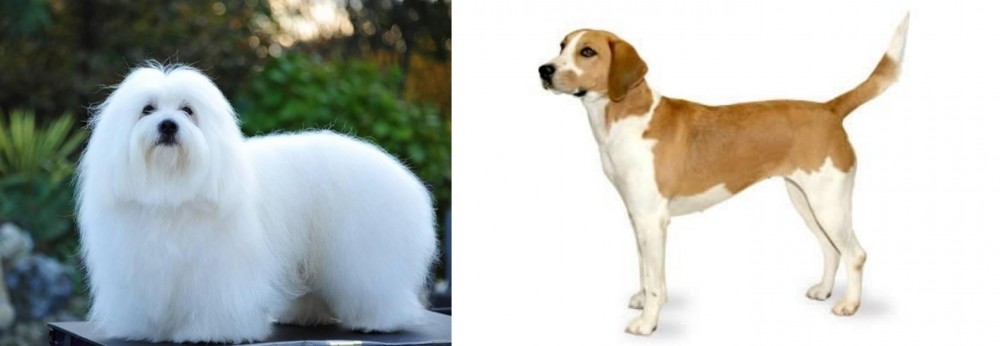 Coton De Tulear is originated from Madagascar but Harrier is originated from United Kingdom. Coton De Tulear may grow 20 cm / 7 inches shorter than Harrier. Coton De Tulear may weigh 21 kg / 46 pounds lesser than Harrier. Both Coton De Tulear and Harrier has same life span. Both Coton De Tulear and Harrier has almost same litter size. Coton De Tulear requires Low Maintenance. But Harrier requires Moderate Maintenance
Coton De Tulear is originated from Madagascar but Harrier is originated from United Kingdom. Coton De Tulear may grow 20 cm / 7 inches shorter than Harrier. Coton De Tulear may weigh 21 kg / 46 pounds lesser than Harrier. Both Coton De Tulear and Harrier has same life span. Both Coton De Tulear and Harrier has almost same litter size. Coton De Tulear requires Low Maintenance. But Harrier requires Moderate Maintenance
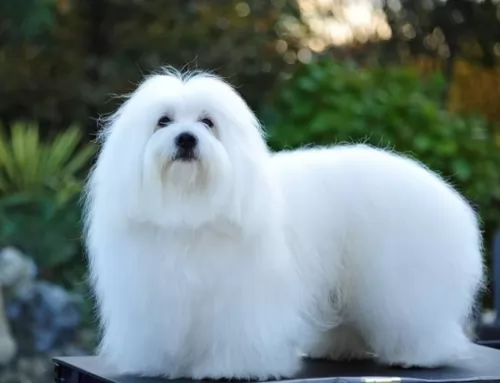 These cute little Coton de Tulear dogs originate from Madagascar and have in fact been named the ‘official dog of Madagascar’.
These cute little Coton de Tulear dogs originate from Madagascar and have in fact been named the ‘official dog of Madagascar’.
The Coton de Tulear actually takes his name from the seaport city of Tulear. In the 1970s a Frenchman brought a puppy to France, with the idea of establishing them as a breed. It was also at this time that the dogs were brought to North America.
This small fluffy white dog was also found on the island of Malta, becoming known as the Maltese. They were mated with other dogs such as the Barbet, a curly haired dog and other coat colors exist such as apricot, black and white and fawn. Other breedings led to the Barbichon family of dogs which includes the Bichon Bolognese and the Bichon Teneriffe. The modern day breeds are the Maltese and the Coton de Tulear.
As with many dog breeds, there are different tales about the origin of the dogs and one version is that the white cotton-ball type of dog survived a shipwreck off the Madagascar coast.
 Developed in Great Britain, the Harrier is another hunting dog – a hound that primarily hunts hares and small prey. The breed itself is medium sized - smaller than an English Foxhound and larger than a Beagle. Although the definitive origins of the Harrier are not set, it is believed that he is a cross of the Basset Hound, Talbot Hound and Bloodhound. Others believe the breed is a cross of the Greyhound and the English Foxhound. The Harrier looks like a smaller version of the English Foxhound.
Developed in Great Britain, the Harrier is another hunting dog – a hound that primarily hunts hares and small prey. The breed itself is medium sized - smaller than an English Foxhound and larger than a Beagle. Although the definitive origins of the Harrier are not set, it is believed that he is a cross of the Basset Hound, Talbot Hound and Bloodhound. Others believe the breed is a cross of the Greyhound and the English Foxhound. The Harrier looks like a smaller version of the English Foxhound.
The Harrier is a pack dog and in 1260, Sir Elias de Midhope established the first pack in England. From there the breed spread to Wales and Western England, most used in Ireland where they hunt fox as well as hares. However, hunting hares is the specialty of the breed and even gave the breed its name. In 1885 they were recognized by the American Kennel Club in the Hound Group. Yet despite this and despite the number of Harriers working in England, they are not recognized by the UKC.
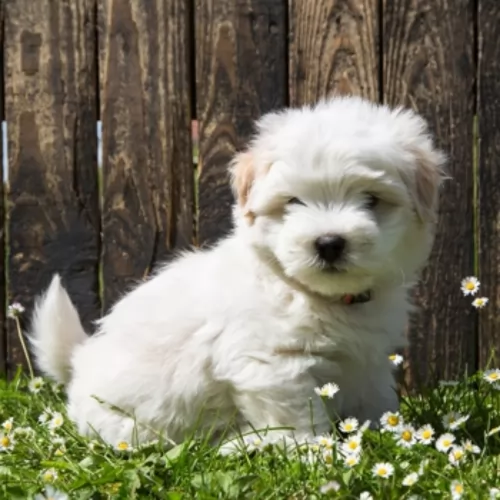 These little dogs make perfect companions. They stand about 25–30cm with the female sometimes being slightly smaller. They weigh anything between 3 – 6kg. They’re robust little canines and can live up to 19 years or so when looked after well.
These little dogs make perfect companions. They stand about 25–30cm with the female sometimes being slightly smaller. They weigh anything between 3 – 6kg. They’re robust little canines and can live up to 19 years or so when looked after well.
The Coton de Tulear is easily recognized because of his soft, fluffy coat. Many people take their dogs to the dog salon to have him washed and his hair trimmed. His legs are short and straight as well as being muscled under the hair. The ears are floppy and the tail of the Coton de Tulear is carried straight or slightly curved.
The Coton de Tulear is a friendly, affectionate dog who has a gentle, cuddly side to him. They are social dogs and get on well with their human family and with the children in the home, loving the games they provide.
He will also get on well with other pets in the home and becomes amicable, relaxed and obedient with socialization and training. Small though he is, he makes a great watchdog too and is full of tricks, making him an entertaining pet to have around.
 The Harrier is a typical hound dog much like the English Foxhound. The breed is a little smaller than the Foxhound but is muscular and large boned like his cousin. They have short hard hair that sheds and ears that hang. The Harrier is a large boned breed built for strength and stamina in the race with hares. They have broad skulls, strong muzzles, with hazel or brown eyes. They also have a black, wide nose and a high, medium length tail.
The Harrier is a typical hound dog much like the English Foxhound. The breed is a little smaller than the Foxhound but is muscular and large boned like his cousin. They have short hard hair that sheds and ears that hang. The Harrier is a large boned breed built for strength and stamina in the race with hares. They have broad skulls, strong muzzles, with hazel or brown eyes. They also have a black, wide nose and a high, medium length tail.
They say he has a ‘courtly grin’ on an expressive face. Being pack dogs, they must be sturdy, able to cover any type of terrain, for as long as the hare runs. It is critical that their scenting and running tools are exceptional. He is blue or yellow-pied. His feet are cat like and the chest is dropped low. He is an extremely well-proportioned dog
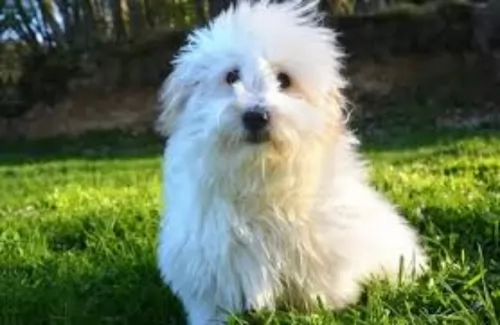 The Coton de Tulear just wants to please his human family and spend unforgettable moments with them, hating to be separated from them. He is such an adaptable little dog and will fit well into city- as well as country life.
The Coton de Tulear just wants to please his human family and spend unforgettable moments with them, hating to be separated from them. He is such an adaptable little dog and will fit well into city- as well as country life.
He is smart, comical, playful, independent and fun to have around as he is known for his clownish personality. Treat him well and he’ll repay you with plenty of love and loyalty.
 Yes, they are good with children but are very rambunctious and should be supervised with young children.
Yes, they are good with children but are very rambunctious and should be supervised with young children.
Scenting ability and wonderful personality
This breed is very adaptable as long as it gets enough exercise. He can live in the country or she can live in the city with an outlet for exercise.
Smart but stubborn at times. Therefore, his learning ability is moderate.
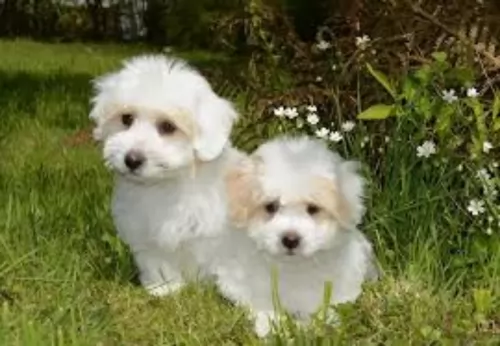 With proper care, your Coton can reach a ripe old age of 15 – 20 years of age. However, even this robust little dog will need to be watched, as he can fell prey to some common dog ailments -
With proper care, your Coton can reach a ripe old age of 15 – 20 years of age. However, even this robust little dog will need to be watched, as he can fell prey to some common dog ailments -
Bad Breath with your pet can be a sign of dental decay. Dental plaque for instance, caused by bacteria, can give your pet a terrible breath. It is important to brush your pet’s teeth 2 or 3x a week. Your vet can provide tips on how to brush your pet’s teeth with a special canine toothbrush and toothpaste.
Other things to look out for are hip dysplasia and chronic allergies. Allergies can cause itchy and dry skin as well as ear infections because of so much hair being in the ear canal. Speak to your vet about how to clean your pet's ears to avoid ear infection.
 It seems the only real health issue other than hunting accidents or foot and toe incidents due to hunting.is:
It seems the only real health issue other than hunting accidents or foot and toe incidents due to hunting.is:
This abnormality in the hip socket can cause arthritis and lameness that is very painful. This is the most severe form. The Harrier can have a milder form that does not progress to this level. Hip dysplasia has a genetic component, but the environment plays a role as well and active hunting dogs are especially prone to this.
Floppy ears that hang down are always susceptible to ear infections. Check them often and clean them at least weekly.
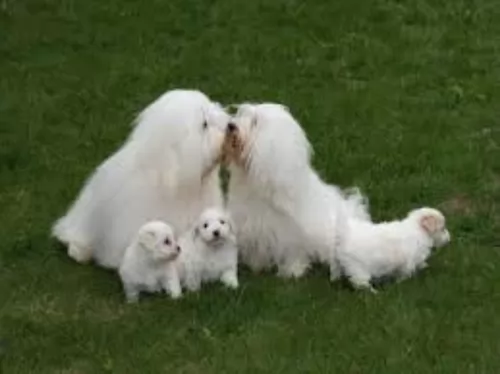 Coton de Tulears will need some exercise if you want him to remain lean and fit. It is important to provide exercise and games for your dog to prevent boredom. Activity levels for any dog, including the Coton, will depend on his age and health.
Coton de Tulears will need some exercise if you want him to remain lean and fit. It is important to provide exercise and games for your dog to prevent boredom. Activity levels for any dog, including the Coton, will depend on his age and health.
A walk every day and some ball games will keep your pet happy and prevent him from resorting to destructive behavior from sheer boredom and frustration.
The long coat will require some careful grooming and you will need to be on the lookout for excess hair around the paws and in the ears.
He is not a great shedder and brushing twice a week will remove loose hairs and provides the perfect opportunity to check for fleas and ticks.
Just like any other dog, your Coton de Tulear will need a warm, dry place to sleep. If you haven’t already invested in a doggy basket or dog bed, you can use a cardboard box for now, before making up your mind what you want for your pet.
A well behaved, obedient dog is a pleasure for everyone, and training and socialization is important, even for a small dog. Your dog will understand simple commands such as ‘sit’, ‘down’ and ‘come’ and also know how to walk well on a leash.
 Feed a high nutrition puppy food dry food made for an energetic breed. Feed 3 times a day ½-3/4 cup each time.
Feed a high nutrition puppy food dry food made for an energetic breed. Feed 3 times a day ½-3/4 cup each time.
Again feed a high nutrition adult food for an active breed. Feed twice a day 1-11/2 cups each time.
Outstanding health unless in a hunting accident.
The Harrier is an energetic, hunting breed that needs a lot of exercise on a daily basis. Long walks and jogging or running is good for the Harrier. If they are not working, hunting dogs they need more exercise. A fenced yard for playing is good. If this intense breed does not get enough exercise and mental stimulation, he needs there could be issues with destructive behavior and obesity. Flyball, tracking, agility, coursing, rally and hunting are great activities for this breed of dog. In addition, they are pack animals and do better in a family that has more than one dog.